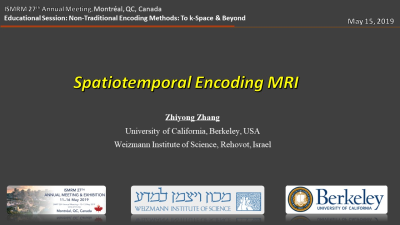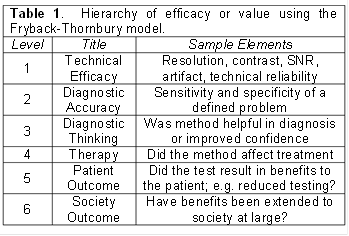Non-Traditional Encoding Methods: To k-Space & Beyond
Non-Traditional Encoding Methods: To k-Space & Beyond
Weekday Course
Weekday Course
ORGANIZERS: Dana Peters, Michael Lustig
Wednesday, 15 May 2019
| Room 710B | 15:45 - 17:45 | Moderators: Lucio Frydman, Michael Garwood |
Skill Level: Basic to Advanced
Session Number: W-08
Overview
This course is an introduction and refresher focusing on non-traditional encoding methods, both more well-known methods such as simultaneous multislice and wave CAIPI, add emerging methods such as non-linear gradient imaging and RF-encoding techniques.
Target Audience
This course is meant to be both an introduction for those who are unfamiliar with non-kspace-based encoding methods, and a refresher, presenting details, updates and insights on these methods.
Educational Objectives
As a result of attending this course, participants should be able to:
- Identify strategies with non-traditional encoding methods, including simultaneous multislice, wave-CAIPI, Spen-Encoding, and RF-encoding methods;
- Describe additional hardware and reconstruction algorithms used for these new encoding methods; and
- Define their current and future roles in clinical MRI.
Overview
This course is an introduction and refresher focusing on non-traditional encoding methods, both more well-known methods such as simultaneous multislice and wave CAIPI, add emerging methods such as non-linear gradient imaging and RF-encoding techniques.
Target Audience
This course is meant to be both an introduction for those who are unfamiliar with non-kspace-based encoding methods, and a refresher, presenting details, updates and insights on these methods.
Educational Objectives
As a result of attending this course, participants should be able to:
- Identify strategies with non-traditional encoding methods, including simultaneous multislice, wave-CAIPI, Spen-Encoding, and RF-encoding methods;
- Describe additional hardware and reconstruction algorithms used for these new encoding methods; and
- Define their current and future roles in clinical MRI.
| 15:45 |
History & State of the Art: Simultaneous Multislice
Rita Nunes
MRI exam times are typically much longer compared to other imaging techniques, motivating the development of methods for accelerating image acquisition. This lecture will focus on simultaneous multislice acquisitions, providing the background for the initial developments and describing some of the latest state of the art methods.
|
|
| 16:05 |
Wave Encoding: The Sequence, the Reconstruction & the Trade-Offs
Berkin Bilgic
Wave encoding is a controlled aliasing strategy which allows better utilization of the spatial degrees of freedom in multi-channel receive arrays. This enables high acceleration rates in parallel imaging without incurring significant g-factor penalty. Conventional spin-warp acquisitions can be augmented to utilize wave encoding using simple sequence modifications. However, this requires a dedicated image reconstruction that captures these modifications on the k-space trajectory. We will focus on wave acquisition and reconstruction techniques as well as the trade-offs in image calculation time, trajectory estimation and potential artifacts, and how these could be mitigated to enable translation of this efficient imaging technique.
|
|
| 16:25 |
 |
Spatio-Temporal Encoding
Zhiyong Zhang
Spatiotemporal Encoding MRI imposes phase modulation (quadratic phase modulation-SPEN, hyperbolic phase modulation-xSPEN) on top of the regular encoded signal, opens a new window for enhancing immunity to image distortions and accelerating the acquisition. In this presentation, I will first introduce the principle of spatiotemporal encoding MRI, and then show the state-of-art applications based on SPEN and xSPEN techniques.
|
| 16:45 |
MRI with Non-Linear Gradients
Gigi Galiana
This course will attempt to describe general features of nonlinear gradient encoding, as well as provide an overview of the methods and applications reported in the literature.
|
|
| 17:05 |
 |
When Will Non-k-Space-Based MRI Become a Clinical Reality?
Stephen Riederer
The purpose of this presentation is to describe the various levels of efficacy or value which are faced by a new technique which is being considered for clinical implementation, including the motivation for these. Further, this general framework is expanded upon for techniques which might be considered “non-traditional.”
|
| 17:25 |
Panel Discussion | |
| 17:45 |
Adjournment |
 Back to Program-at-a-Glance |
Back to Program-at-a-Glance |  Back to Top
Back to Top